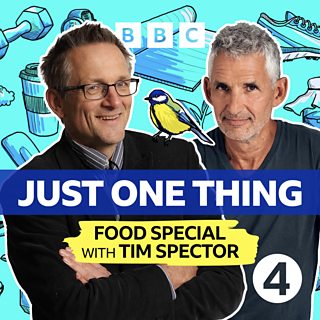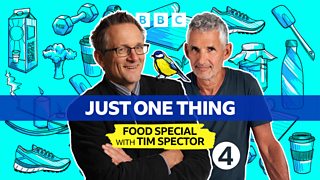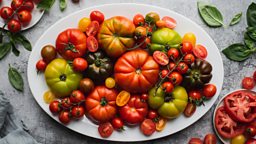5 simple food tips for better health and wellbeing
When it comes to nutrition, diet and healthy eating, there’s a lot of information to digest. And some of the plans and programmes on offer seem to require considerable effort and commitment.
So for a simple and sustainable guide to healthy eating, Dr Michael Mosely asked leading nutrition and gut health expert, Prof Tim Spector, to join him for a special edition of Just One Thing. In the podcast, Tim offers a handful of invaluable food tips for better health and wellbeing…
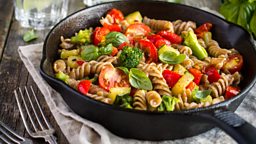
Tip 1: Avoid ultra-processed foods
We often worry about fat, sugar and salt content but, Tim Spector says, the real health threat comes from ultra-processed foods, or “fake foods”, as he calls them, which only contain extracts of natural ingredients as well as added flavourings. Tim cites examples such as “converted starches, modified refined sugars, gums, emulsifiers, and artificial sweeteners,” adding “I think virtually all children's food and children's yoghurt is ultra-processed.”
In the UK, we have the highest intake of ultra-processed foods in EuropeProf Tim Spector
“In the UK, we have the highest intake of ultra-processed foods in Europe” says Tim, “and it's not a coincidence that we also have the highest rates of childhood obesity and adult obesity, and diabetes.”
What a diet of ultra-processed food does to your system
Michael Mosley and Tim Spector’s son, at the request of his dad, went on fast food diets for two weeks and ten days respectively. During this time, Michael put on three kilos, his waist size increasing by three centimetres, and his blood sugars went into the diabetic range. “I also developed these crazy cravings for this stuff, and it really lowered my mood.”
Tim’s son felt ill after four days of the diet, but Tim made him persist for the sake of science! He also put on weight and lost between 30%-40% of his species in his gut microbe.
“This is a great example of what the British public are doing,” says Tim. “Many people are eating over 90% of all their calories as ultra-processed foods, knocking out their gut microbes, increasing their appetite and lowering their mood.”
Tip 2: Change up your breakfast
Dietary experimentation can be gradual and Tim’s next tip – change your breakfast – is a good example of this.
Tim found that what appeared to be a healthy breakfast – muesli, tea with low fat milk, orange juice and, sometimes, brown toast and marmalade – led to him to gain a kilo in weight every year for 10 years! He also discovered – via a glucose monitor – that his breakfast put his blood sugars into the diabetic range. However, his wife, who ate the same breakfast, did not experience the same sugar spike.
Tim’s solution was to change to a high fat breakfast of full fat yoghurt with nuts, seeds and berries. He also switched his tea to coffee, which has a positive effect on gut microbes. The effect was revolutionary: no more sugar spikes, no mid-morning hunger pangs, much better mood.
“Do a little experiment at home for a week and find out what suits you,” says Tim.
Tip 3: Have one shot of fermented food a day
Eating fermented foods – such as yoghurt, cheese, kefir, kimchi and sauerkraut – means eating live microbes and introducing different and beneficial species into the gut.

“There are many more species than you get in probiotic tablets,” explains Tim, “so you're getting a bigger range, particularly with the kefirs and the sauerkraut.” Once ingested, the microbes that don’t get wiped out by stomach acid travel to the lower intestine and send signals to the microbes that already exist, producing healthy chemicals and improving the immune system.
A recent study found that fermented foods can reduce inflammation levels by up to 25% after just two weeks of ingesting five mini-doses. “It's been shown to be helpful in so many different diseases,” adds Tim, “but we do need much more research on it.”
It’s important to note that if you’re pregnant you have to check whether certain cheeses are safe to consume. Meanwhile, those on anticoagulants have to avoid many fermented foods. Finally, flatulence is a universal risk from fermented foods!
Tip 4: Restrict your eating hours
Tim believes that “intermittent fasting”, where you don’t change what or how much you eat, just the time window you’re eating in, has a beneficial effect. It essentially gives your microbes a well-earned rest. On the other hand, extending the eating time window (in the UK the average is around 16 hours) causes sugar spikes, creating problems for our metabolism, and also encourages overeating and interrupts out sleep.
As with changing up your breakfast, intermittent fasting is about finding what works for you. A huge study involving 80,000 people, which Tim was part of, showed that keeping a ten-hour eating window (between convenient start and end times) improved mood, sleep patterns, energy levels and microbiome. Most participants also experienced some weight loss.
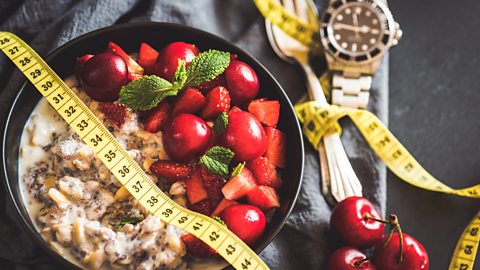
What is time restricted eating and how can it improve our health?
Michael Mosley asks Dr Emily Manoogian.
Top tip: Eat 30 plants a week
Tim’s top food tip is to eat 30 plants a week. But don’t panic – this is not a regime which only a herbivorous dinosaur could achieve! Plants include fruits, vegetables, nuts, seeds, herbs and spices. Even coffee – as a fermented bean – counts, as does dark chocolate. The width of the definition makes this goal much easier to achieve.
“It’s about getting variety in your plate,” says Tim. His morning yoghurt with nuts, seeds and berries takes care of around eight different plants alone. Sadly, chips, rice and pasta don’t count – but pasta sauces are a great way of introducing beans and legumes, for example.
“It's time to think of food in a different way.”
Summing up, Tim Spector observes: “Food is not about macronutrients. Food is not about calories. It's not about fats. It's not about sugars and proteins. It's about these thousands of chemicals in each plant that interact with our gut microbes and our immune systems.”
-
![]()
Just One Thing: Food Special
Prof Tim Spector gives his five top food tips to maximise health and wellbeing.
